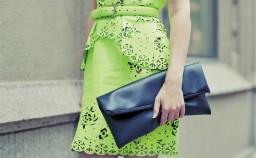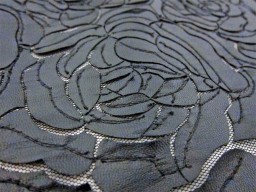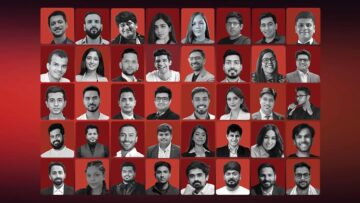
Laser cutting is a technique of relevance to a large cross-section of apparel, accessories, footwear and home furnishing manufacturers. Even within the category of apparel manufacturers, this technique encompasses a broad spectrum of applications – be it high-fashion women’s wear or kids’ wear or high performance activewear (laser perforation). Interestingly, laser cut designs are now more often showing up on the mood boards and fashion ramps around the world. At the same time, dominance of laser cuts is complemented by the plethora of technological advancements that facilitate mass production of these seemingly intricate and irreproducible designs.
Since this effect is furnished without applying any pressure on the fabric, one ply at a time, i.e. no part of the cutting process requires anything other than the laser to touch the material being cut, there are no unintended marks left on the fabric and the chance of contamination of the cut is very less. And hence, the splendour of a laser cut piece lies in its extremely accurate cuts, sealed fabric edges, one of a kind visual appeal and even functional benefits in some cases. Moreover, laser cut can be performed on a variety of materials like cotton, silk, leather, polyester and neoprene, to name a few.
As is the case with most of the value addition processes, laser cutting is mostly carried out by dedicated service providers. The time taken to furnish a design decides how much a laser cut design will cost. The time taken is further influenced by the intricacy of the design and the material to be worked upon. For example, thicker fabrics like denim and suede are easy to handle, which brings down the costing while sheer and fluid fabrics like silk and chiffon demand higher handling and time of operation, hence higher costing. Currently, the average charges are around INR 5-6 (8-9 cents) per minute.
Noida-based Ess Pee Fabrics is one such service provider who is catering to a broad spectrum of apparel manufacturers ranging from leading Indian fashion designers like Manish Arora and Rohit Bal to premier exporters like RMX Joss, Orient Craft, Richa Global and Meenu Creations for Product Development as well as production runs. “The market is at an unbelievably exciting point.
We are working with new concepts every day in terms of product development, in use of fabric type and combining laser cutting, engraving and embroidery!” shares Praveen Arora, Director, Ess Pee Fabrics, who will soon be adding 50 new high-precision laser cutting machines to his existing setup. The company already has a total of six European-make laser engraving machines from EuroLaser and Chinese-make GBOS laser cutting machines.
Going beyond the archetypal georgettes, rayon and polyblends; unconventional fabrics like denims and suede have entered into the space of laser cutting. “Though the requirement of laser cut in felts and velvets is only at its initial stage but is still a major requirement with the buyers, not only for apparels but also for home furnishings, gift items, labels and trims. The market of laser cutting is expanding every day; and this technology is being combined with several others to achieve a unique effect of its kind,” shares Kunal Sawhney, Director, K M Tex, a 12-yearold laser cut service providing company functioning with 12 laser cutting and engraving machines from UK, US and China. The company has recently purchased a laser cut embroidery bridge machine owing to the rising demand in the industry.
Going beyond the archetypal georgettes, rayon and poly-blends; unconventional fabrics like denims and suede have entered into the space of laser cutting. With consumers becoming appreciative of these techniques, companies are adopting new problem-solving and economical technologies to manufacture apparels and trims using such techniques.
Machineries for Laser Cutting
Embroidery and engraving are often combined with laser cutting to achieve the quintessentially high on design effect. Catering to the specific requirement of embroidery with laser cutting is China-based Wuhan Golden Laser Co.’s QJDT-800-5 Bridge Laser Embroidery Machine. Primarily an embroidery machine, QJDT-800-5 can be coupled with a Laser Bridge. In fact, overall structure and core components of the machine use modular assembly, for easy and quick installation, and significantly shortened delivery cycles. Users can select the most suitable configuration according to the application needs of the product. With laser power ranging from 80W to 250W and cutting area of 300 mm × 300 mm to 500 mm × 500 mm, the machine’s laser bridge can move 1200 mm/s. These machines are available in India through Golden Laser India Pvt. Ltd., a joint venture with Wuhan Golden Laser Co.
On the other hand, SmartCarver (CMA-6040 1080 1390 1610 1810 1910) and PN-1080 1380 1490, from China-based Yueming Laser Technology Company are laser engraving cutting machines catering to the designs with engraving as well as laser cut elements. SmartCarver controller is built from internationally advanced 32 digits DSP chip, greatly improving the performance of the engraving cutting machine. Whereas, PN1080 1380 1490 utilizes advanced DPS control technology, self-developed laser power source and integrated frame-structure to ensure the working stability and reliability. It supports AutoCAD, CoreIDRAW, CAD, CAM and other graphical software, thus directly outputting pictures. The laser machine is equipped with USB port, which supports hot plug and can quickly transport data for higher working speed and efficiency. While both machines can engrave 0-64000 mm/min, they can cut 0-36000 mm/ min. Yueming’s solutions are available in India through IIGM.
With consumers becoming appreciative of these techniques, companies are adopting new problemsolving and economical technologies to manufacture apparels and trims using such techniques. Companies like Mazak Optonics Corporations, have launched SUPER TURBO-X laser cutting system, which features a proprietary vibration dampening frame and integrated laser resonator that ensure stable, highaccuracy cutting. Since each of these machines is compatible with materials as varied as wood and cotton, different machines are not needed for different fabrics.










